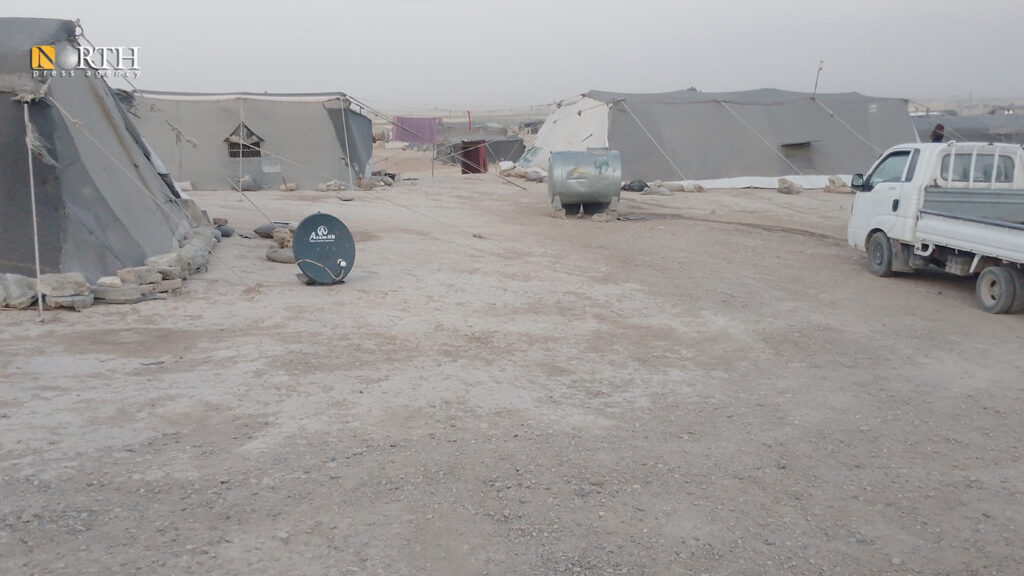RAQQA, Syria (North Press) – Sarah al-Muhammad’s proficiency in sewing proved as advantageous as she discovered a means of livelihood in the sewing machine, helping her to support her husband in securing their family’s financial needs.
The 41-year-old woman, who is an IDP from eastern Syria’s Deir ez-Zor and currently residing in Sahlet al-Banat camp in the eastern countryside of Raqqa, north Syria, spends nine hours daily operating a manual sewing machine to support her ill husband who is incapable of working.
In order to provide for their families, IDPs residing in makeshift camps in Raqqa are compelled to work. The majorities earn their livelihood by working outside the camp in the markets of the city of Raqqa or in nearby farmlands, as well as by scavenging scrap metal and plastic.
After displacing to the camp three years ago, al-Muhammad started sewing to provide for her living amid lack of aid provided by NGOs.
Sahlet al-Banat makeshift camp, east of Raqqa, houses 1,570 families, including 7,811 children and 6,000 women. There are also 20 people with special needs, according to statistics obtained by North Press from the Raqqa Civil Council.
Al-Muhammad has a family of six, all of whom cannot work. The father is sick, and her eldest child is 14 years old.

On a daily basis, al-Muhammad earns about 20,000 Syrian pounds (less than $2), with which she secures some of her family’s needs, and also buys some medicines for her sick husband, who suffers from heart disease and diabetes.
Despite the simplicity of the amount she earns compared to the expenses she needs, she has no other means, “with a share that supports a jar,” as she put it.
Although the amount she earns is too few in comparison to her family’s expenses, she has no other choice. As she puts it, “half a loaf is better than none.”
IDPs are unable to secure many of their needs due to their already difficult living condition, lack of aid provided by NGOs, and the significant ongoing devaluation of the Syria pound, as it exceeded 13,000 SYP against one dollar.
Muhammad Sido, 43, from Hama Governorate in central Syria who is living in Sahlet al-Banat camp, works as a porter for 20,000 SYP per day due to the lack of aid and humanitarian assistance provided to them.
He describes the IDPs situation as a slow death because of the challenging economic conditions brought about by the high prices linked to the US dollar exchange rate. He further explains that they are barely surviving.
Sido also works as a guard for 12 hours in the fodder market (Khans) for 500,000 SYP per month. However, due to his inability to support his family’s expenses, he is looking for additional work due to the dire living condition.
Sido calls on the concerned authorities and the NGOs to support the camp in which he lives due to the difficult living conditions that the displaced suffer from.
Earlier, the Autonomous Administration of North and East Syria (AANES) called on the UN to assume its responsibilities towards the IDPs, who suffer from difficult humanitarian conditions due to the withdrawal of organizations from northeastern Syria.
The AANES was first formed in 2014 in the Kurdish-majority regions of Afrin, Kobani and Jazira in northern Syria following the withdrawal of the government forces. Later, it was expanded to Manbij, Tabqa, Raqqa, Hasakah and Deir ez-Zor after the SDF defeated ISIS militarily there.
Like many other IDPs, Maryam al-Sheikh, 34, an IDP resides in Tel al-Bay’ah camp, five km east of Raqqa, works in one of the Khans packing fodder for a wage of 2,000 SYP per ton.
Tel al-Bay’ah camp houses about 346 families, including 1,739 children and 1,385 women, with 11 individuals having special needs.
This highlights the challenging situation faced by the displaced persons in the camp, where many are forced to engage in hard labor to earn a meager income to support their families.
Displaced women in makeshift camps in Raqqa, work in packing fodder in sacks, in exchange for wages agreed upon with the employers, which may be per ton or according to hours.
Al-Sheikh is a daily laborer; she is paid about 16,000 SYP the day she managed to find a job.
The women work within a workshop that they formed, and they sometimes work on a piece-rate basis, which pays more but requires greater effort to complete the agreed-upon task.
The piece-rate is a work arrangement where the employer and employees agree on a fixed rate for the completion of a task, regardless of the number of hours worked. The employer is not responsible for the duration of work, and the workshops aim to finish the job quickly to move on to another task on the same day.

